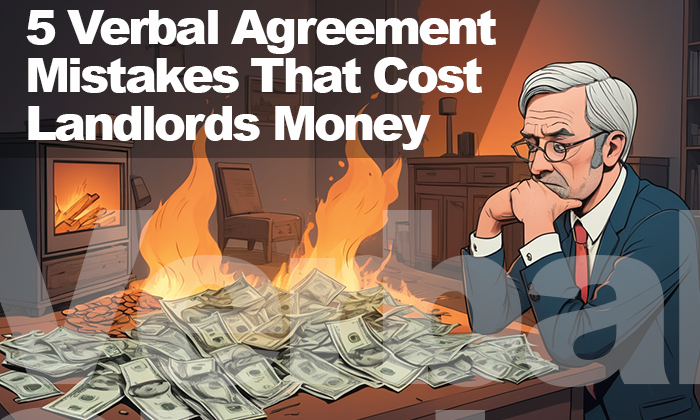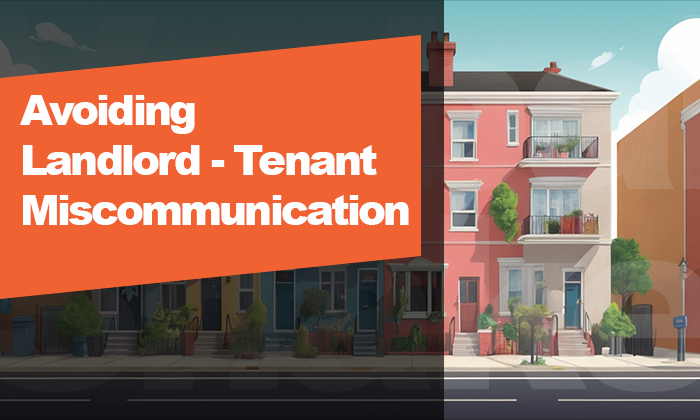5 Verbal Agreement Mistakes That Cost Landlords Money (And How to Avoid Them)

As a landlord, it’s tempting to keep things informal, especially when you have a good relationship with your tenant. A quick conversation feels easier, more personal, and less confrontational than drafting a formal contract.
But verbal agreements are a slippery slope. Without a written record, what seems like a simple, friendly conversation can quickly turn into a costly misunderstanding.
Here are five common verbal agreement mistakes that cost landlords money—and more importantly, how you can avoid them.
Mistake #1: “Just Pay Me When You Can”
It sounds generous and understanding, right? Life happens, and you want to be flexible. But without a clear deadline, this informal agreement can quickly backfire.
Why It’s a Problem:
- The tenant might interpret it as having an indefinite grace period, leading to delayed payments for weeks or even months.
- If rent is delayed long enough, you might find yourself struggling to pay the mortgage or other property expenses.
- Worse yet, if a dispute arises and you try to collect late fees, the tenant could argue that there was no due date agreed upon.
Real-Life Example:
A landlord agreed to let a tenant pay rent “when they could,” thinking it would be just a few days late. But the tenant interpreted it as an open-ended arrangement. Three months later, the landlord was still chasing payments, and the tenant claimed they were never officially “late” because no specific date was set.
How to Avoid It:
- Set a clear deadline. Instead of saying, “Pay me when you can,” say, “Rent is due by the 15th this month. Late fees will apply after that date.”
- Document It: Send a quick text or email confirming the arrangement:
“Just to confirm, rent is due by the 15th this month. If payment isn’t received by then, late fees will apply as per the lease agreement.” - Use Verbal Shake: Verbal Shake makes it easy to document temporary payment arrangements without drafting a formal contract. You can quickly record the agreement, get confirmation from the tenant, and keep a clear record to avoid disputes later.
Mistake #2: “Sure, You Can Have a Pet As Long As It’s Well-Behaved”
Pets can be a sensitive topic for landlords and tenants. You want to be accommodating, but you also want to protect your property. Saying, “As long as it’s well-behaved” feels like a reasonable compromise... until you realize how subjective “well-behaved” can be.
Why It’s a Problem:
- What does “well-behaved” mean? Is it no barking? No damage? No accidents inside the house?
- Without clear guidelines, disputes can arise if the pet causes damage or becomes a nuisance to neighbors.
- You could be left footing the bill for repairs, cleaning, or even legal action from other tenants or neighbors.
Real-Life Example:
A landlord allowed a tenant to have a dog, assuming it was a quiet, well-trained pet. But the dog frequently barked, damaging the door frame by scratching. The tenant argued that barking was normal dog behavior and didn’t violate the “well-behaved” agreement.
How to Avoid It:
- Be specific. Instead of saying “well-behaved,” specify the rules, like:
- No barking that disturbs neighbors.
- No damage to the property, including scratches, stains, or odors.
- Regular cleaning to prevent pet-related odors.
- Document It: Send a message detailing the pet policy.
Example:
“You’re allowed to have a dog under the condition that there’s no excessive barking, no damage to the property, and the unit is kept clean and odor-free. Any violations will result in cleaning or repair fees.” - Use Verbal Shake: With Verbal Shake, you can create a simple pet addendum that clearly outlines the rules, responsibilities, and consequences for violations.
Mistake #3: “You Take Care of the Small Repairs, and I’ll Handle the Big Ones”
This seems like a fair division of responsibility, but the problem lies in the definition. What’s “small” and what’s “big”? Without specifics, you’re setting yourself up for disagreements and potential neglect of important maintenance.
Why It’s a Problem:
- What’s considered “small” to you might seem “big” to your tenant—or vice versa.
- If repairs are delayed due to disputes over responsibility, small problems can turn into costly damages.
- Neglected repairs could violate local housing codes or safety regulations, leading to fines or legal issues.
Real-Life Example:
A landlord told a tenant to handle “small” repairs like leaky faucets. But when the leak worsened, the tenant insisted it was now a “big” repair and the landlord’s responsibility. The delay caused water damage, leading to expensive repairs and mold remediation.
How to Avoid It:
- Be specific about what qualifies as “small” or “big.” For example:
- Small Repairs: Changing light bulbs, unclogging sinks, replacing air filters.
- Big Repairs: Plumbing issues, electrical problems, HVAC repairs, structural damage.
- Document It: Send a message detailing the repair responsibilities.
Example:
“You’re responsible for minor maintenance such as changing light bulbs, unclogging drains, and replacing air filters. I’ll handle major repairs like plumbing issues, electrical problems, and structural maintenance.” - Use Verbal Shake: Record the agreement clearly with Verbal Shake to prevent disputes about repair responsibilities.
Mistake #4: “You Pay the Utilities, and I’ll Cover the Rest”
This sounds straightforward until the first utility bill arrives. Without clearly defining what “utilities” include, you’re opening the door to confusion and potential disputes.
Why It’s a Problem:
- Does “utilities” cover water, electricity, gas, internet, and trash collection? What about maintenance fees or HOA dues?
- If the tenant leaves the utilities in your name and fails to pay, you could be stuck with unpaid bills or even utility shutoffs.
- Disputes over who owes what can drag on for months, damaging the landlord-tenant relationship.
How to Avoid It:
- Be specific about which utilities the tenant is responsible for and which ones you will cover.
- Document It: Confirm the arrangement in writing, like:
“You’re responsible for paying water, electricity, and gas bills. I’ll cover internet and trash collection. Utilities must be paid directly to the provider by the due date.” - Use Verbal Shake: Easily create a clear utility agreement with Verbal Shake, specifying payment responsibilities to avoid disputes.
Mistake #5: “I’ll Refund Your Deposit If Everything Looks Good”
This sounds fair, but “looks good” is subjective. Without clear standards, disputes over cleaning and damage deductions are almost guaranteed.
Why It’s a Problem:
- Tenants might think the unit “looks good” as long as it’s tidy, while you expect it to be professionally cleaned.
- If deductions are made from the security deposit without clear justification, the tenant could take legal action.
How to Avoid It:
- Set clear, detailed standards for move-out conditions, including cleaning requirements and acceptable wear and tear.
- Document It: Clearly state the conditions in writing, like:
“The security deposit will be refunded if the unit is professionally cleaned, free of damages beyond normal wear and tear, and all personal belongings are removed.”
Use Verbal Shake: Use Verbal Shake to document the move-out conditions and avoid disputes over the security deposit.
The Lesson: Avoid Costly Disputes with Clear Documentation
It doesn’t take a formal contract to protect yourself—just a quick written confirmation of what was agreed upon. Even a text message or email can prevent costly misunderstandings.
That’s why we built Verbal Shake. It makes it easy to document these agreements before they turn into expensive problems.
Want to learn more? Contact us today or sign up for updates on our launch.



